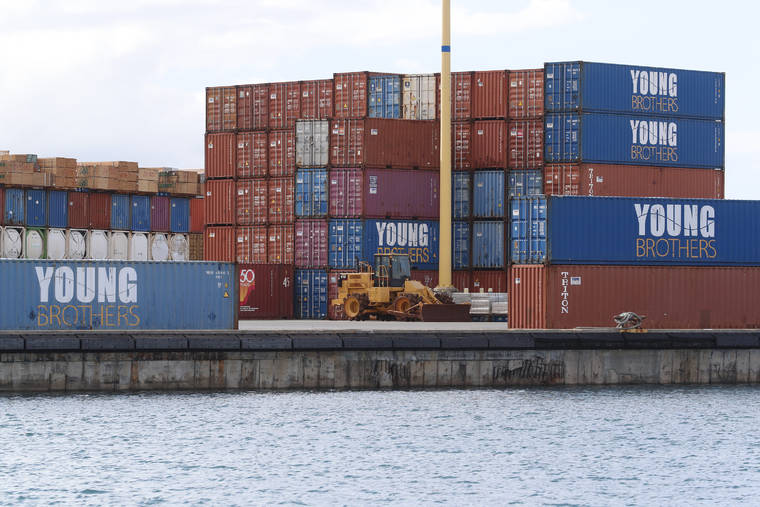Hawaii’s regulated ocean cargo transportation monopoly, which has been treading water, now has a better shot at avoiding insolvency while maintaining its role as a lifeline to neighbor island businesses, with delivery of groceries as well as others goods and materials.
But cargo customers now contending with economic fallout tied to COVID-19 will be pinched hard — paying 46% more to ship goods with Young Brothers LLC, under a ruling issued this week by the state Public Utilities Commission (PUC) that grants a yearlong emergency rate increase.
It’s a hard blow to an already weakened economy, and Young Brothers bears some of the blame for this mess. Going forward, the PUC and other policymakers must ensure that the company adopts needed reforms and steadies the ship.
Given that the tourism industry makes up for about one-third of the economic pie on the neighbor islands, the jumbo-sized rate hike will be painful — especially to cash-strapped small businesses who will likely have little choice other than to pass along some of the pain to their customers by way of higher price tags on goods.
Due to Young Brothers’ dire financial outlook — on the verge of being unable to pay its bills or continue funding operations — and the utter dependence on its deliveries among at least a few hundred neighbor island customers, the PUC, too, seems to have had little choice other than to agree to this unfortunately timed and jarringly steep rate hike.
The hike is expected to boost Young Brothers’ interisland shipping revenue by $27 million — slightly less than the proposed $30.4 million increase the company had sought based on its break-even financial projection. The PUC’s ruling includes several welcome conditions, including an audit of the company’s financial and management practices, which the commission described as still a concern.
PUC oversight includes examining Young Brothers finances and operations to allow a reasonable rate of return because state regulation bars competition but also mandates service to smaller ports that typically aren’t financially viable. Given that the company’s flailing in recent years appears to have been at least partially avoidable, its emergency request was particularly wince-worthy.
Several months before coronavirus concerns surfaced here, the company was projecting a loss of upwards of $12 million this year, on top of losses of $10 million and $11 million the previous two years. In a November meeting with the Honolulu Star-Advertiser editorial board, Young Brothers executives said they would pursue a substantial rate hike — and acknowledged that part of the problem was failure to request any incremental rate increases for the past five years.
Among other contributing factors: a drop in interisland cargo and increased operating expenses to employ its 370-member workforce and maintain specialized equipment and facilities.
But while the PUC had yet to rule on that request, COVID-19 shutdowns spurred still higher operating costs and lower cargo volumes, resulting in more debt — and threatening the reliability of essential tug-and-barge services between islands. In May, it reduced weekly sailings between Honolulu and Hilo from two to one.
Then, in early June, parent company, Saltchuk, stopped picking up the tab for Young Brothers’ losses. In response, Young Brothers drafted plans for more cuts in service, and turned to the Legislature, which subsequently opted against funding a bailout plan.
In response to the 120-year-old company pivoting back to the PUC with a fresh bid for emergency relief in July, regulators have rightly imposed shape-up conditions. In addition to requiring Young Brothers to undergo an audit by an independent party selected by the commission, it’s tasked with developing and implementing a comprehensive customer service plan.
In coming months, the shipper will need to convince customers, the PUC and others that it’s capable of managing itself back into solvency and good financial health.

